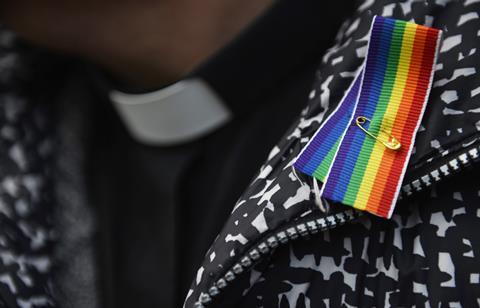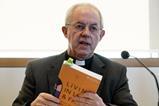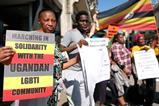Sean Doherty is a same-sex attracted Christian who has been part of the Living in Love and Faith process since the beginning. He believes the CofE needs to take more time for proper discernment over the Church’s position on gay marriage

I have been fully involved with the Church of England’s Living in Love and Faith process since it began. As an Anglican ethicist, I was invited to be a member of the theology and ethics working group, one of several groups set up to resource and inform the project. After the LLF resources were produced, I became a member of the Bristol diocese LLF reference group, and led an LLF course at Trinity College Bristol, where I am the principal.
I have participated in good faith in the process, trusting that this was an opportunity for people across the Church to work together to try to find a way forward that was “founded in scripture, in reason, in tradition, in theology and the Christian faith as the Church of England has received it”, as the Archbishop of Canterbury put it when launching the project in 2017.
Simply to state that there is a difference of opinion is not an act of discernment
But this is not just an academic matter for me. I also write as one of the minority of LGBT people who believe that the current teaching of the Church is true and good for us and should not change. (You can find out more about my story here).
Following the LLF process, the bishops of the Church of England have now published proposals for prayers for couples in committed relationships, including same-sex couples. The Church of England’s General Synod will soon be voting on whether or not to welcome the bishops’ proposals.
As a member of that Synod, I am not able to welcome them as they currently stand, and I want to share my concerns about the proposals. I do this in a spirit of genuine dialogue. There may be things I have misunderstood or overlooked, and I hope I can be corrected where I am wrong.
My concerns are as follows:
1. The bishops give no reasoned theological or biblical basis for their proposals
Given the enormous amount of theological and biblical study that has gone into the LLF process, I am bewildered at the lack of engagement with this in the bishops’ proposals. I don’t doubt that, as individuals, they have studied and thought things through. But they do not explain how and why their proposals make theological sense – and they can’t expect people to go along with them unless they do. That would amount simply to an act of power, whereas the power of bishops properly derives from their authority as teachers of the Christian faith.
We should give the bishops some benefit of the doubt here. Their first residential opportunity for discussing LLF was cancelled due to the death of the late Queen. If they had had more time, perhaps they could have worked through a theological basis for their proposals together. But it is surprising that they did not take more time to develop this.
The closest I can see to a rationale given is that a) the bishops don’t agree among themselves and b) that society now has a very different understanding of sex and relationships to the Church.
Both are questionable grounds for theological change and innovation. If we are to support the bishop’s proposals, we need a coherent theological account of how and why these prayers emerge from what we believe, as Christians, about human relationships. If there is not sufficient agreement to articulate such an account, that is something the bishops need to address before they make proposals.
2. A discernment has not taken place – only a compromise
Several times in the document, the bishops set out different possible perspectives on issues which are absolutely fundamental to this matter, such as the doctrine of marriage and sexual ethics.
Simply to state that there is a difference of opinion is not an act of discernment. Discernment involves waiting patiently on the Holy Spirit until the Spirit reveals a way forward together. A compromise leaves us no further forward as a Church than we were before the LLF process.
A discernment does not necessarily mean unanimity. A parallel would be the question of the ordination of women as priests and bishops (which I fully support). On that matter, the CofE has reached a clear decision. Those who are ordained must recognise and respect this, even if they personally disagree.
3. The absence of a theological, ethical basis leads to significant hostages to fortune
We are told that the bishops “joyfully affirm, and want to acknowledge in church, stable, committed relationships between two people” (GS2289 p1) and “celebrate in God’s presence the commitment two people have made to each other is an occasion for rejoicing” (Prayers, p2).
Does this mean stable, committed relationships between any two people should be affirmed and celebrated in church? Of course the bishops cannot seriously mean this. Two people in an adulterous relationship might exhibit stability and commitment to one another. But the bishops have articulated no principle by which legitimate and illegitimate stable, committed relationships can be distinguished.
4. The distinction between civil marriage and Holy Matrimony is theologically wrong
The bishops’ proposals rely on a distinction between same-sex civil marriages, and the Church’s doctrine of Holy Matrimony. This distinction has to be made in order to justify the bishops’ claim that you can be in a same-sex marriage without “challenging or rejecting the Church’s doctrine of marriage” (Response, p7). But, as the CofE marriage service puts it: “Marriage is a gift of God in creation”.
Do bishops think that opposite-sex couples in civil marriages are not really married? Of course not. Civil marriages are real marriages. You don’t need to be married in church to be married in God’s sight.
The bishops do not explain how and why their proposals make theological sense
Whether a legal distinction between civil marriage and Holy Matrimony is sustainable (see my colleague Paul Roberts’s critique of the distinction here), the CofE doesn’t currently accept such a distinction. Not so long ago, the House of Bishops argued that clergy cannot enter same-sex marriages because, “getting married to someone of the same sex would, however…clearly be at variance with the teaching of the Church of England”. Were they wrong then, or now?
5. These proposals will tear the Anglican Communion apart
The CofE has a unique role in the Anglican Communion, both in terms of historical role and leadership under the Archbishop of Canterbury. These developments are likely to be unacceptable to many Anglican churches around the world, which may withdraw from the Communion or at least break fellowship with the CofE.
6. It undermines the Church’s teaching about sex
The proposed prayers make a careful distinction between blessing the couple, and blessing their relationship (which the bishops do not propose to do). They acknowledge that the Church cannot bless relationships which are at variance with its teaching. However, this clever distinction is unlikely to be noticed much in practice.
Do bishops think that opposite-sex couples in civil marriages are not really married? Of course not
While the bishops may claim proposals are technically consistent with the doctrine of the Church, they are, at the very least, indicative of a departure. They will give a false impression of what the Church teaches and believes about marriage and sex. For example, one of the prayers asks God to “keep them faithful to the commitment they have made to one another”. For most couples, that commitment will assume and include a commitment to sexual intimacy - which the Church actually teaches belongs only in opposite-sex marriage.
7. The proposals will lead to pastoral and evangelistic tensions
Same-sex couples may approach their local church for these prayers, only to be told that their clergy person is not willing to offer them. How will those couples feel? In some congregations, clergy will want to offer the prayers while people in their congregations may object.
Elsewhere, congregation members will want the prayers while clergy will not feel able to offer them. This is likely to have a serious impact on the mission of local churches and on clergy wellbeing.
8. There is no provision for those who cannot go along with the proposals
The bishops’ document speaks of respecting the consciences of those who are not willing to use the proposed prayers. This promise has no power to bind other bishops in the future, and there is no mention of any mechanism for protecting such respect – something which General Synod has scrutinised carefully with respect to other matters in the past. I have already had multiple conversations with ordinands and clergy (of different underlying convictions on sexuality) who are concerned about being asked in future job interviews whether they will offer the prayers, and how that will be interpreted.
As the meeting of General Synod approaches I will be praying for a gracious debate, which treats LGBT people with the respect that we deserve. But I will also be praying that the bishops reconsider their approach and take more time to pray and listen to God together, until they can discern a way forward which is truly “founded in scripture, in reason, in tradition, in theology and the Christian faith as the Church of England has received it.”
For I do not believe that these proposals yet are.





































4 Readers' comments